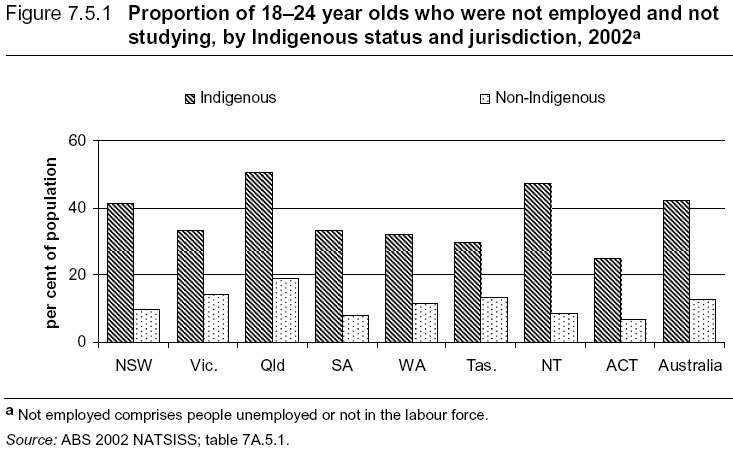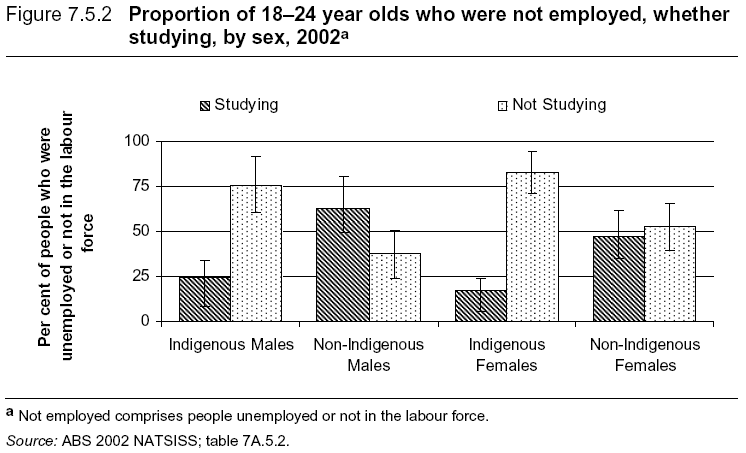|
Editorial-27 December 2005 |
|
Overcoming Indigenous Disadvantage. (December 27, 2005)
"To those of you who argue from the higher education sector that there is a crisis, can I just say to you, please desist at that kind of language... If you want to see a crisis, have a look at school attendance by Aboriginal Australians in Arnhemland: 25-54%. If you want to see a crisis in education, consider that only 16 of 378 Aboriginal children outside of Darwin and Alice Springs can pass a basic year 3 reading test." [Dr. Brendan Nelson, Minister for Education, Science and Training, to the AAS dinner, May, 2002].
In November 2002 Dr Nelson's Department of Education, Science and Training
issued its 158 page paper,
National Report to Parliament on Indigenous Education and Training, 2001.
It makes interesting and depressing reading.
Here are a couple of charts from that report followed by a couple from another DEST report issued in July 2005.
From
National Report to Parliament on Indigenous Education and Training, 2001![]()
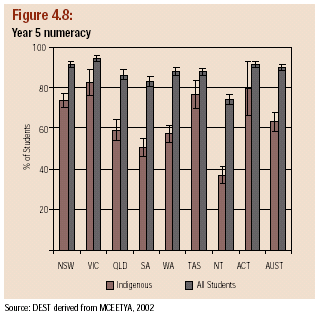
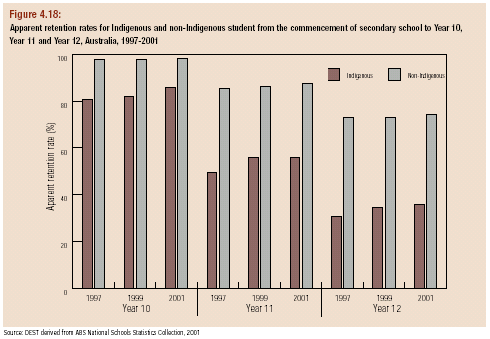
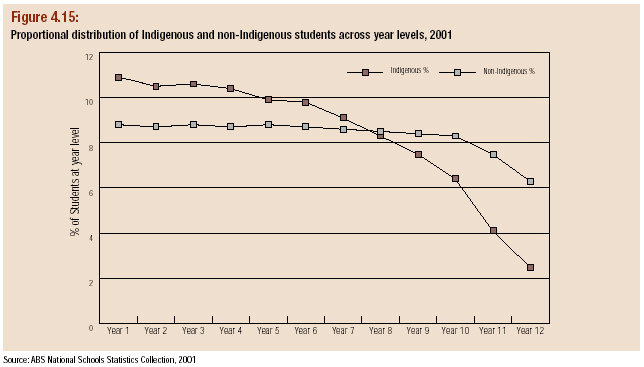
And from
Overcoming Indigenous Disadvantage: Key
Indicators 2005![]()
|
|
Today, over 3½ years after Dr Nelson chastised the fellows of the Australian Academic of Science, The Sydney Morning Herald's chief political correspondent Louise Dodson reports on "Lessons that may be learned from Israel".
Dodson tells her readers that Professor Elite Olshtain, from the Hebrew University in Jerusalem who on her return to Jerusalem from Far North Queensland said "Israel wants to share the experience gained by teaching a lot of disadvantaged groups."
What this comes to is Israeli educators have had an 80 per cent success rate using their specially developed accelerated learning techniques which are being used to teach communities within Israel, such as Bedouins, Arabs and refugees from African countries such as Ethiopia. And they are interested in refining their methods and if possible exporting them. Fair enough.
The first phase of Professor Olshtain's Australian project has now been completed. 192 students and 53 teachers at Halls Creek in north Western Australia, Arukun in North Queensland and Shepparton in Victoria were involved, and the project is to expand to NSW and South Australia next year.
According to Dodson, "The Yachad Accelerated Learning Project employs techniques similar to those used to keep gifted children interested in school, but is aimed at improving literacy and numeracy among disadvantaged indigenous students. [I]t involves taking weaker students out of regular classes; intensive one-on-one tutoring and custom-made educational activities to suit the student; working with teachers; and involving the students' families and the entire community in the education process."
But Dodson also issued the caveat, "While [Professor Olshtain] remains hopeful of continued success, she acknowledges the project was more difficult than expected." Considering the goals the project sets for itself that shouldn't be too surprising.
A bit of history. Following a visit to Israel by Marcia Langton, head of indigenous studies at the University of Melbourne, where she saw how the teaching method worked in bridging the gap between needy communities and the mainstream population she advised that a pilot be set up in Australia, and Dodson says "the indigenous leader Noel Pearson lent his strong support to the project, presenting an argument to the Education Minister, Brendan Nelson, why it should be funded. 'The work of the Israelis may offer us a realistic fast track for bridging the education divide that we as a nation have failed to properly address,' Pearson wrote to Nelson." Sponsorships have also been obtained from a number of private organisations.
But what isn't clear is whether the approach is a realistic one from the viewpoint of overcoming the educational gap between Australia's indigenous citizens relative to its non-indigenous citizenry. Note specifically that the teacher to student ratio in the pilot project was 1 to 3.6.
On the other hand Professor Olshtain's point that, "Israel wants to share the experience gained by teaching a lot of disadvantaged groups," is undeniably valid.
So now over 3½ year's after Dr Nelson gave the Academy Fellows a stiff back hander are we witnessing just another aspect of governmental window dressing.
Truth be told Dr Nelson as the government's instrument for Education, Science and Training appears to have taken Conan the Barbarian as a role model, though perhaps somewhat undersized, and as a constructive force for Education, indigenous or otherwise, he leaves a legacy of detritus if not outright carnage.
Alex Reisner
The Funneled Web
